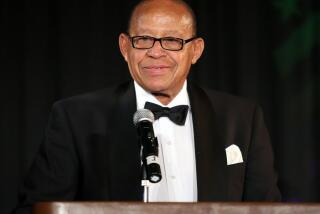Wallace Turner dies at 89; journalist won Pulitzer for local reporting
- Share via
Wallace Turner, a tenacious investigative reporter who won a Pulitzer Prize in 1957 with the Portland Oregonian and later became a bureau chief in San Francisco and Seattle for the New York Times, has died. He was 89.
Turner died Saturday at Sacred Heart Medical Center in Springfield, Ore., of complications from old age, said his daughter Kathy.
Turner and fellow Oregonian reporter William Lambert shared the Pulitzer for local reporting for their examination of corruption involving Portland officials and the Teamsters Union. The Pulitzer board said the reporters “fulfilled their assignments despite great handicaps and the risk of reprisal from lawless elements.”
“Our focus was on the [county] district attorney and the hoodlums,” Turner told the Oregonian in 1998. “Anytime you take on a district attorney and accuse him of criminal activities, you’ve got a tiger by the tail. It was a hell of a fight.”
Journalist Tom Wicker, in his 1975 book “On Press,” said Turner possessed the perfect ingredients for a first-rate investigative reporter: “a prosecutorial zeal, an urge to seek out the wrongdoer, a rather cynical conviction that determined search will always find a wrongdoer.”
Turner worked for the New York Times as a writer and bureau chief in San Francisco and Seattle from 1962 until his retirement in the late 1980s. Among the stories he covered were the 1978 shootings of San Francisco Mayor George Moscone and Supervisor Harvey Milk by former Supervisor Dan White.
Henry Weinstein, a former Los Angeles Times reporter and longtime friend of Turner, recalled how Turner’s account in the New York Times included information not found elsewhere. “Wally paced off the distance between Moscone’s office and Milk’s office and described that distance in his piece,” Weinstein, a professor at UC Irvine’s law school, said in an e-mail. “The detail was devastating. It was classic Wally — brilliant simplicity.”
In 1961 and ‘62, Turner was an assistant secretary of Health, Education and Welfare and served as press secretary for Abraham Ribicoff, the first HEW secretary in the Kennedy administration. Turner spent a year after winning the Pulitzer on a Nieman Fellowship in a program at Harvard for mid-career journalists and briefly worked in television.
Wallace L. Turner was born March 15, 1921, in Titusville, Fla., and grew up in the Ozarks. He received a bachelor’s degree in journalism from the University of Missouri in 1943.
In June of that year he married Pearl Burk. He joined the Army but was discharged early because of asthma. The young couple moved to her home state of Oregon, and Turner became a night police reporter at the Oregonian, which he called “that miserable job” in an interview with the newspaper in 2000.
“Underneath the city’s skin there was considerable rot,” he said. “I knew it was there, but nobody really gave a rat’s … uh, cared … about public corruption.”
In “On Press,” Wicker told how Turner, “blunt as a billy club,” reported in 1952 on abuses by the Bureau of Indian Affairs in the sale of Indian trust lands near the Rogue River in Oregon. The coverage earned him his first of two Heywood Broun Awards, given by the Newspaper Guild for reporting that champions the disadvantaged.
In 1957, Turner and Lambert testified before the Senate’s Permanent Subcommittee of Investigations. Turner’s comments were recounted in “We Band of Brothers,” a 1971 book by Edwin O. Guthman, a former national editor for The Times.
“Time and again we have been visited in secret places at night by honorable working men who complained of their inability to take action to stop the improper activities of their union leaders,” Turner said. “Without exception, they were in terrible fear that their visits to us might become known to their union’s bosses.”
Turner wrote two books, “Gamblers’ Money — the New Force in American Life” in 1965 and “The Mormon Establishment” in 1966.
In addition to his wife and daughter Kathy Turner of Eugene, Ore., he is survived by daughter Betty Turner Everett of Laguna Beach; a granddaughter, Katie Everett; and his brother, Bill, of Springfield, Mo. Another brother, Albert, died in 2003.
keith.thursby@latimes.com
More to Read
Start your day right
Sign up for Essential California for the L.A. Times biggest news, features and recommendations in your inbox six days a week.
You may occasionally receive promotional content from the Los Angeles Times.






